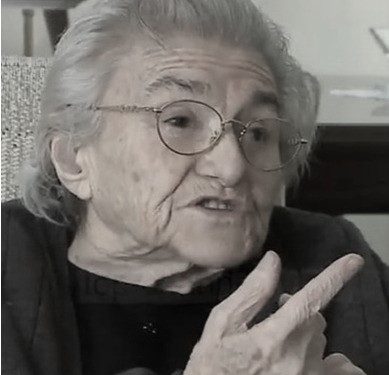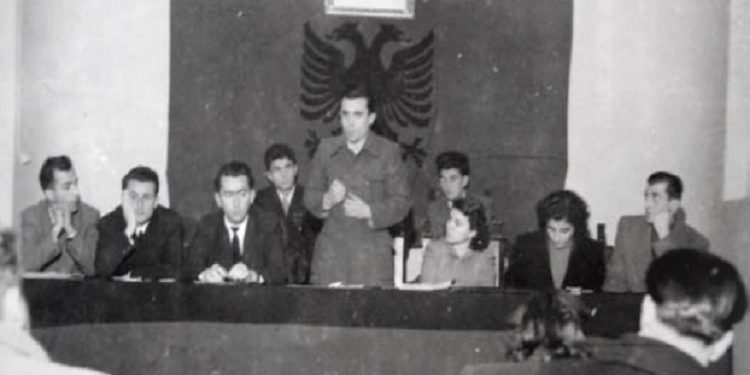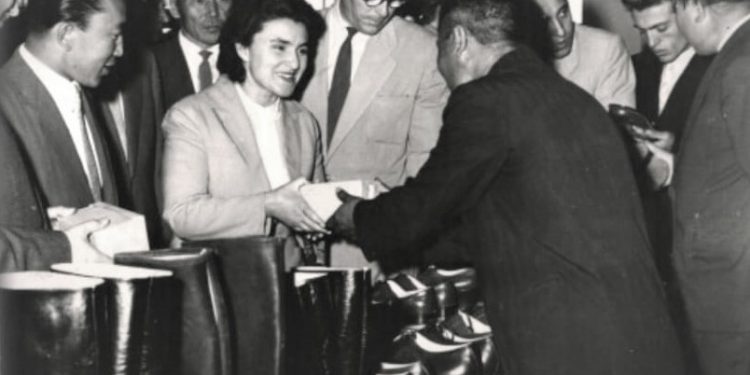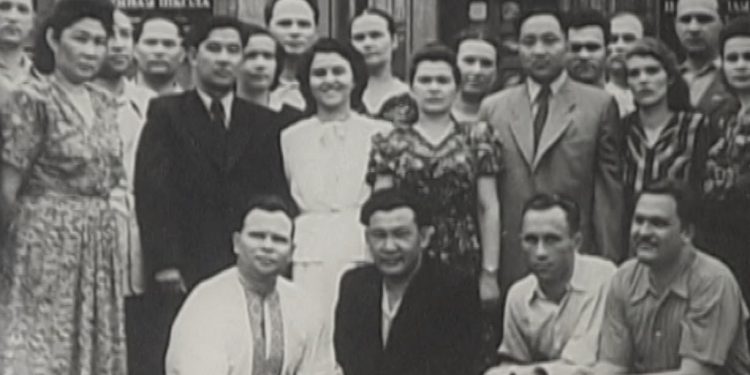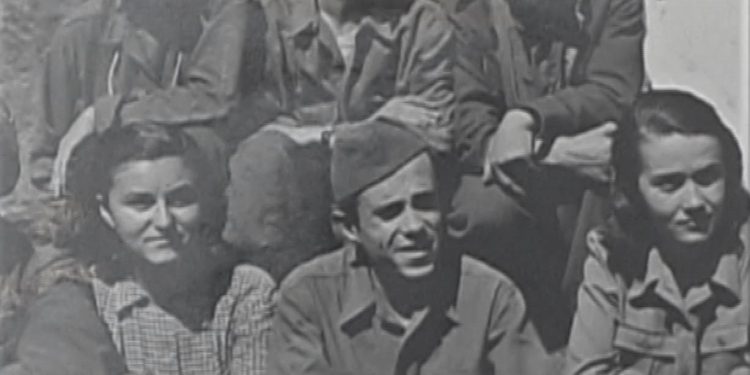By Elisabeta Ilnica
The first part
Memorie.al / She were only 16 years old, when she was accepted as a member of the Regional Committee of the Communist Youth of Tirana, that is, also of the Anti-Fascist Youth. While a year later, he was entrusted with the direction of all the youth of the capital. At the age of 18, she was elected a member of the Central Committee of the Communist Youth of Albania and soon after, she found herself in the Central Committee of the Communist Party. This was Liri Belishova, who lost her eye as a teenager in the War, while after the war, she lost the titles she received, and she lost her daughter Drita, but also two husbands, Nako Spiron and Maqo Çomon. She lost 31 years of her life in exile and many of her friends. Also educated in the former Soviet Union, one of the main exponents of the Anti-Fascist National Liberation War, a member of the Political Bureau and the Central Committee of the ALP, she was expelled in 1960 as an “enemy of the Party”, initially interned in Gjirokastër and then in Cërrik and Mallakastër, until 1991.
Liri Belishova talks exclusively about all this in this interview, which we are publishing in several consecutive issues! She was involved in the debates for the 70th anniversary of the liberation, telling the truth about what she had seen and what she knew: What should be appreciated and criticized in the Anti-Fascist National Liberation War? What was the role of the Yugoslavs for the election of Enver Hoxha at the head of the Albanian Communist Party? How Enver Hoxha tried to unite Albania with Yugoslavia and then defended himself, saying that: “it was just a provocation, how would Tito react”!?
Political Commissar of the General Staff of the National Liberation Army and then Commander-in-Chief of the National Liberation Army, how did Enver Hoxha leave the war without direction in two winters? Which protagonist from the Anti-Fascist National Liberation War would be “perfect” for the head of the NPSH or the head of the War, instead of Hoxha? Was Albania liberated by its own forces, as is often claimed, without the help of any military formation of the forces of the Anti-Fascist Alliance?
Why such a great victory of the Anti-Fascist National Liberation War, then degenerated into a dictatorship?! In the fight against the invaders, there were also other non-communist political forces, such as “Balli Kombëtar”, “Legaliteti”, etc., why did communism win and these political forces lost? Why were the “Mukje Agreement” broken, and Enver’s letters to propagandize them as “collaborators of the occupier” and to execute them behind their backs, without trial? How were the brothers of Musine Kokalari killed on the day of liberation by order of Enver Hoxha and throwing the dance around them?
The elimination of Enver Hoxha’s political opponents over the decades, what does Liri Belishova know about them? Does she herself feel responsible for the executions from after the war until 1960, before she was dismissed from political functions and exiled for 31 years? Beyond what has been said, what was the “real fault” of Liri Belishova, that she could not swallow Enver Hoxha or someone else? What were her relations with the women of LANÇ, who then became wives in Block? Why do you think that Nako Spiro, Mehmet Shehu, etc., did not kill themselves and make Enver Hoxha directly responsible for that?
How does Liri Belishova feel when in various activities for the liberation of Tirana or Albania, the portrait of Enver Hoxha is raised…?! These are just some of the questions that the 89-year-old gave answers to in this interview that has been taking place since the end of November 2014, little by little, for several weeks in a row, due to her serious health condition, but with a memory to amaze you, in characters and dates. The conversation was often interrupted both by the illness and by the narrator’s emotions, especially when Drita appeared in his memories, the girl who passed away prematurely at the age of 23, about whom he repeatedly repeated: “He never saw a white day “. A hostage who has no comforting words that Liri Belishova can take away…?!
Ms. Belishova, what would you briefly mention as successes and failures of the Antifascist National Liberation War?
The Antifascist National Liberation War, of the Albanian youth and people against the Italian occupiers, actually began in the first days of April 1939, when high school youth demonstrated not only condemning this aggression, but also asking for weapons to fight, to protect the independence and freedom of the homeland. But the King of Albania and the Albanian governors failed to organize a resistance, to organize the people, the youth in this war.
Undoubtedly, small Albania could not withstand the aggression of a large and heavily armed power, such as Fascist Italy was then. The resistance was necessary for many reasons, which are understandable, but also because this aggression was accompanied by a very large, deafening and demagogic propaganda on the part of Mussolini, his party and his state, justifying this aggression, as if the Albanian people, he sought help from Italy, to save him from the rule of a tyrannical King.
That they did not actually do this. The king and his closest collaborators fled those who remained, some accepted this occupation, and were even in the delegation that pierced the Crown of Albania, King Victor Emmanuel III of Italy. Because the occupation of Albania by fascist propaganda was justified as the union of two Kingdoms, under one crown; under the Royal crown of Emmanuel III.
So, Italy did not call it an invasion of Albania…?!
Of course, the Italians did not call it an invasion. And those who cooperated with the Italians did not call it an invasion, but a union of Italy with Albania, under the same crown. Then this invasion of Albania by Italy was not really opposed, we can even say it was approved, by all the great powers of Europe. Both Great Britain and France, which were democratic and anti-fascist powers.
Because it was a policy of concessions to the fascist and Nazi aggressors, they thought that by giving them these pieces, such as Abyssinia, such as the Sudeten region and then Czechoslovakia itself, Spain, Albania, they would be able to reduce the aggressive appetite of Hitler’s Germany and of fascist Italy.
It was definitely an unfair and short-sighted policy that led to the start of World War II and the involvement of Great Britain, then the United States of America, entering into an alliance with the former Soviet Union, which had a treaty secret agreement with Nazi Germany, declared as a non-aggression treaty, but in fact it was a treaty that guaranteed Germany’s eastern border, giving her the ability to attack France and other countries without risk.
These things were not known then, these documents were discovered later, the famous Mollotov-Ribbentrop treaty, i.e. the treaty between Stalin and Hitler “de facto”, but signed by their foreign ministers.
What should be appreciated and criticized in the Anti-Fascist National Liberation War?
The Anti-Fascist National Liberation War of the Albanian people, as I said, started in the first days of April 1939, when student youth erupted in demonstrations, where not only was aggression condemned, but weapons were also demanded to defend the homeland, to defend the homeland . This made an extraordinary impression on the outstanding patriot and intellectual, Mirash Ivanaj, who was also the Minister of Education in the Albanian Kingdom.
He expressed himself with the most emotional words, precisely for this reaction of the Albanian youth. But, not having a political party to lead this resistance, this war, there was a deadlock, a relatively quiet period followed and only after the creation of the Albanian Communist Party, the possibility was created for this resistance to have an organizing center. The NPSH was founded on November 8, 1941, that is, after the Soviet Union, the socialist homeland, had been attacked.
The communist groups, which were the basis of the formation of the Communist Party, when fascist Italy attacked and occupied Albania, did not all take a clear position. Some spoke out and condemned this aggression, there were also currents within these communist groups that maintained a very condemnable attitude, saying that the fascist occupation will create opportunities for the industrialization of Albania, that is, for the birth and development of the proletariat and thus, will the development of the communist movement was also favored.
What were these currents within the communist groups that took this kind of attitude?
These were the former communist groups, as I said. I don’t remember which group expressed such thoughts, but when the NPSH was created, one of the criticisms that was made and that was leveled at other communists was exactly this criticism. So for those who did not take a proper stand against the fascist occupation?
In fact, it is the occasion to emphasize that, after Stalin and Hitler signed the famous treaty of 1940, which we talked about above, the communist parties of the world stopped the unmasking and the fight against fascism, although the Seventh Congress of the Comintern, in in 1935, had made the unmasking of fascism the central problem for the communist parties.
He charged these parties to use the fight against fascism, against Nazism, to connect with the masses, because fascism endangered all layers of the population of Europe, and the most prominent intellectuals of Europe had risen against it in the first place. They saw this as an opportunity for the communist parties to gain the support of their own people, for their purpose, to take power, to establish the dictatorships of the proletariat.
Are you saying that in 1941, when the NPSH was founded, that Albania was alone, since the communists of other countries left the fight against the fascist occupation?!
But then the Soviet Union was attacked. All parties took from the Communist International that still existed (dissolved in 1943), their main task was to defend the socialist homeland, to fight Nazism. So it was a different situation. The Communist Party was not formed after ’39, the communist groups were not alarmed enough to form a party, but when the Soviet Union was attacked, then they were alarmed and united within a few months and formed the Communist Party.
How do you explain this?
Comments are redundant on some things, the facts speak for themselves. That is, those communists put the socialist homeland in the first place and the homeland, which was the real homeland, in the second place.
What role did the NPSH play during the war, did this party have an identical axis or was it just a copy of the Yugoslav Communist Party?
The anti-fascist resistance started in the first days of 1939, but failed because it did not have a leading and organizing force. After the establishment of the NPSH, it took on the role of organizing this struggle, and in the founding resolution of the party, it is expressly stated that this struggle will help the party connect with the masses. The party must ensure its hegemony in this war at all costs. And at the end of this war, the logical conclusion was that the party would win the opportunity to take power. And did the NPSH have an identical axis of its own…?
The misfortune of the Albanian people has been twofold. Not only was this Communist Party founded that actually had no social base in Albania, that Albania was not an industrialized country, had no proletariat, had no past with trade unions, labor movements, etc. But the misfortune was that this Communist Party, since its establishment, was connected with the Yugoslav Communist Party, acted under its leadership, copying all forms of organization and politics. This Yugoslav Communist Party was represented in Albania by its two emissaries, Miladin Popovici and Dushan Mugosha.
Have you had the chance to personally meet these two emissaries, Popović and Mugosha?
I have never met Mugosha. I met Milad Popovic for the first time in Helma, where the First Youth Congress took place. Before the Congress started, I went there as a delegate of Tirana, as the head of the youth delegation of Tirana. From the field of Lirza, where the Congress was held, I went down to Helma, where the General Staff was located. There, I saw Milad Popovic for the first time. I asked Nako: Who is this tall man? (It was longer than Enver Hoxha). He answered me: Miladin Popovici. I shouted: Wow, why is it real?!
Why did you react this way, what was true?
Because until then I did not believe that Miladin Popovici and Dushan Mugosha were close to the Communist Party, in its leadership. I thought that these were propaganda of the enemies of the Albanian Communist Party.
So, in the Albanian Communist Party, they were against these emissaries…?!
I didn’t know that there was a Miladin Popovic called “Ali Gostivari”, that was his nickname. While Dushan Mugosha, they called him “Sala”…!
What impression did Popovici leave on you?
Popovic didn’t even talk to me. Popovich and I met in Bari, Italy, in September 1944, or at the end of August, when I had gone to have an eye operation. He was in Bari for a meeting of the Central Committee of the Yugoslav Communist Party, which was held in Italy, because in Yugoslavia, there were still occupiers and war was going on. Miladini had then come from Albania and would not return to Albania. Then I talked several times with Miladin.
And… impressions of it?
I was very young then. From the way he spoke about the Albanian youth, when he introduced me to a representative of the Yugoslav youth; and then about the way he spoke, about the struggle of the young women and women of Albania, when he introduced me to a delegation of Yugoslav women who would come to Albania to assist in the First Congress of the Anti-Fascist Union of Albanian Women, it appeared that he was very enthusiastic about the struggle of youth, of women, of the Albanian people. I formed the opinion that on this occasion he wants to highlight and launch his role, which is what I was able to do. In fact, Popovici was the “de facto” chairman of the Albanian Communist Party.
Was it really “de facto”?
Yes, it was. Enver Hoxha himself said this at the meeting of the Central Committee of the Albanian Communist Party.
Were you present when he said this?
No, I was not there, but it is the record: “For me, Miladin was the teacher. I was his student. What Miladini said, for me, was indisputable”, said Enveri.
Did Enver do well to take the Yugoslavs to create the NPSH?
Enver did not take the Yugoslavs. Enveri then, was just a sympathizer of Korca’s group. He was not even a member. While these three communist groups, the one from Korça, Shkodra and the Youth Group, which had its largest base in Vlora, had their own militants. But these militants were eliminated by Enver and Miladini. They were eliminated not only politically, but also physically. Miladini preferred Enver, primarily because he saw in Enver, a man who did not oppose him.
A man who obeyed him completely. And I think he was not wrong. Miladini calculated that Enveri would obey him, that it was Miladini who raised him and who would raise him, until he made him General Secretary of the Party. It is an interesting thing that Kristo Frashëri wrote, who did not read the minutes of the founding meeting of the Albanian Communist Party.
This record was captured by the fascist police, during the control they did to the base, the house, where the party equipment and party documents were. Since then this record has not been found. I believe that it disappeared on purpose, because the fascist police would have this report somewhere. The archives of the fascist state and the fascist police fell into the hands of the partisans after Albania was liberated, but they are nowhere to be found.
So there is no original record?
No, it was not found. Kristo Frashëri, where did he get the materials for these minutes?! From police documents. From a fascist police report, writing for the Communist Party. So in this document, parts of this minutes have been put. These parts were used by Kristo Frashëri, drawing the conclusion that in the party formation meeting, Enver Hoxha always supported Miladin and Dushan. But other communists, such as: Qemal Stafa and Koço Tashko, even more so those of the “Group of Youth”, have had objections and debates. So it is not by chance, is the conclusion of Kristo Frashëri that Enver Hoxha, was chosen by Miladini kept him close and made him chairman.
With these developments, can we say that Enver Hoxha was a person at the right time and in the right place, or had he made his contributions in the meantime…?
We can say this that Miladin Popovici will choose Enver Hoxha. It’s hard to choose. Suitable for him. Because Enver Hoxha obeyed Miladin Popovic and then the Yugoslavs, until Stalin broke with Tito. It got so far that Enver Hoxha wrote to Tito: “We agree that Albania should join Yugoslavia”, i.e., that Albania should be swallowed by Yugoslavia. “And we ask you to tell us the date, when we should do this”. This is the document in the State Archives.
Meanwhile, the opposite is claimed, that Enver Hoxha has promised Tito that he will give him Kosovo…?
They are different events. When Enver Hoxha went to Yugoslavia, the first visit he made was the summer of 1946, in the talks he had “head to head” with Tito, he also raised the issue of Kosovo. I think it was written, but I don’t remember where and on what occasion, that the ambassador of Albania in Moscow, Koço Tashko, had written to Enver Hoxha, that: “comrades here think that you can also raise the issue of Kosovo” . But the issue of Kosovo then, was very sharp and not only in Kosovo that they did not accept to be in Serbia, because the Italians united Kosovo with Albania, for their interests…!
Enver Hoxha, when he met with Tito (I don’t remember well, the document should be seen, whether Tito or Enver opened the issue of Kosovo), told him that: “Kosovo is inhabited by an Albanian majority and they want to join Albania. But we cannot do this, because the Serbian bourgeoisie will accuse us that you are breaking up the Yugoslav state”. When Enver Hoxha tells this to the Soviet ambassador in Tirana, who asked him about the talks with Tito: “What about you, Enver, how did you answer?”
Enver answers: I told him, “OK, friend Tito”. The ambassador wrote this conversation to his leadership. The Russians have published and are publishing volumes of archive documents and in one of these volumes is this report of the Soviet Embassy in Tirana. We don’t have any other document about these “head-to-head” talks between Enver and Tito.
Now, I believe that not only me, but every Albanian would think: Why not Comrade Enver, you said “I agree”, but you should say: “Comrade Tito, the Serbian bourgeoisie accuses you, but the Kosovo bourgeoisie accuses me and Albania, the people of Kosovo accuse me of having promised self-determination during the war. This is the right, that Kosovo has the right to Self-Determination according to the Atlantic Charter”. While Enveri only said: “OK, friend Tito”…! Memorie.al
The next issue follows




